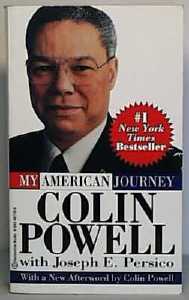 |
|
 |
|
 |
 |
 |
 |
 |
 |
 |
 |
 |
 |
| 2016 Election: | Hillary's book | Trump's book | Bernie's book | Ted Cruz's book | | | 2016 Senate Debates |
My American Journey, by Colin Powell  (Click for Amazon book review)
BOOK REVIEW by OnTheIssues.org: This book is Colin Powell's autobiography, beginning with growing up in the ethnically-diverse neighborhood of the South Bronx in New York City of the 1930s, and ending with his service in the Clinton Administration in the 1990s. Powell is of West Indian (Caribbean) descent; his neighborhood included that group and other African-Americans, as well as many Jews, Italians, and other European groups. The book details his early army career, and his postings abroad and at the Pentagon as he rose through the ranks. An early posting in Germany, as a Lieutenant leading a squad on the front line of the Cold War, was echoed later when he had the same posting as a General, leading the NATO armed forces at the ready for a Soviet incursion across the Fulda Gap. Another early posting was in Vietnam as an "advisor" under President Kennedy in the 1960s (before America became fully engaged in the war and before the anti-war movement took full effect). Powell was injured by a "punji stick" boobytrap and exited Vietnam, but not before being persuaded even then that the war was unwinnable without a very large American army. With his formative years in the military in Vietnam and then in the Cold War, Powell accepts the "Reluctant Warrior" label from Bob Woodward's book "The Commanders." And Powell explains in detail the origin and development of the more well-known label, the "Powell Doctrine." But Powell repeats more than once in this book a more political doctrine too: "Great leaders are almost always great simplifiers," which he applies to Reagan and, implicitly, to himself. Powell first articulated what later became known as "Powell Doctrine" in Panama in the late 1980s: have clear political goals; go in big; and end it quickly. Powell's view of the Panama conflict focused mostly on how to do that in the context of full live press coverage. Powell points out that there was no military reason to take down the main Panamanian broadcast tower, but the press demanded it, so the army had to do it, despite that incoming president could have used the broadcast capability a few days later once the dictator was removed by US forces. Other than fighting the press, it seems, Panama was a solid example of implementing the Powell Doctrine. The issues of the press and the Powell Doctrine became worse in the Kuwait War in the early 1990s: there he applied the same rules but says it was the first war in history covered live from the enemy's capital city. He watched on TV as CNN reported incoming US missiles, and noted CNN's speculation as to their purpose, while Powell of course knew their purpose. He also details minutely the decision to NOT continue to Baghdad after Saddam's forces were ejected from Kuwait -- and points out that that will be an ongoing question for historians. But Powell applied the Powell doctrine's first clause -- stick to your political objective -- which was clearly mandated by the UN in that case to only eject Iraq from Kuwait, not to topple Saddam. The book was written in 1996, before Powell served as Secretary of State under George Bush Jr., but after Powell had gained fame as the commander of the Kuwait War under George Bush Sr. The book includes Powell's time as Chairman of the Joint Chiefs of Staff -- a mixed military-political position -- and Powell makes it clear that he preferred military roles to political roles. This book did fuel speculation that Powell would run for President in 2000, and again after his State Department stint in the 2008 race -- but Powell never expresses in this book any interest in running for office. Powell does note that in 1992 a movement arose for Bush to dump Dan Quayle and replace him with Powell (prompting Powell to call Quayle and apologize). Also in 1992, Bill Clinton asked Powell to be vetted for his own Vice Presidential list; Powell declined. Powell has consistently said that he "does not hear the calling" to run for President. But he concludes the book with a call for reduced partisanship, describing himself as not fitting into either major political party. Powell describes his political philosophy as "fiscally conservative but with a social conscience." That makes him an ideal candidate for AmericansElect or a third party in 2016, so speculation continues despite Powell's consistent denials. -- Jesse Gordon, editor-in-chief, OnTheIssues.org, February 2013
| |||||||||||||||||||||||||||||||||||||||||||||||||||
| |||||||||||||||||||||||||||||||||||||||||||||||||||
Page last edited: Dec 12, 2018